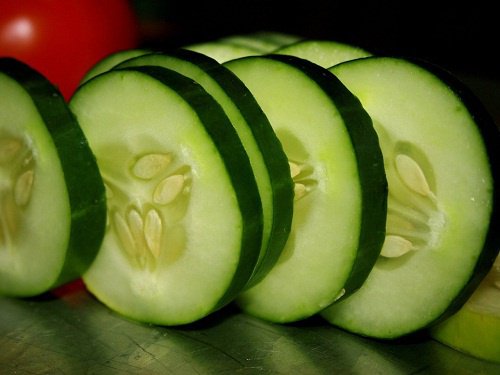Cucumbers: The Surprising Truth You May Not Know


Reviewed and approved by the pedagogue in physical education and nutritionist Elisa Morales Lupayante
Cucumbers are popular vegetables worldwide, and belong to the same family as watermelon (Cucurbitacae). Although this vegetable has been used for years in gastronomy, they’re also recognized medicinally. They offer high nutritional value and a vast amount of health benefits.
They’re composed of 90-95% water, making them low in calories. Moreover, they also offer small amounts of vitamin K, B vitamins, copper, potassium, vitamin C and magnesium. Consequently, all of these contribute to better health and avoiding common nutrient deficiencies caused by a poor diet.
There are many reasons to consider cucumbers an essential food in any diet. Do you know why they’re so healthy?
Cucumbers protect the brain

Thanks to this compound, cucumbers are considered an ideal vegetable. Moreover, they improve memory and protect nerve cells from age-related deterioration.
They reduce the risk of cancer
Even though cucumbers are mostly water, the rest is rich in antioxidants. Moreover, they contain polyphenols that are associated with a reduced risk of cancers like breast, uterine, ovarian and prostate.
It’s also been discovered that they contain phytonutrients called cucurbitacines. These possess important anti-cancer properties, according to the Geroge Mateljan Foundation.
Cucumbers fight inflammation

Moreover, their high water content helps fight fluid retention, which is one of the principal causes of inflammation in the body.
Studies conducted on animals have determined that cucumber extract can reduce the body’s inflammatory response. Therefore, they are capable of halting the activity of inflammatory enzymes within the body.
Rich in antioxidants
They contain important antioxidants like vitamin C and beta carotene which both play an important role in the body’s immune response.
They also contain an important concentration of antioxidant flavinoids. These include quercetin, luteolin and kaempherol. All of these play an important role in preventing chronic disease, including cardiovascular.
Natural breath fresheners
Bad breath is almost always caused by bacteria that accumulates between the teeth and gums. Cucumbers fight bad breath.
According to the principals of Ayurvedic medicine, eating cucumbers helps release excess heat from the stomach. Consequently, this is one of the main causes of bad breath.
Fight stress

Eating cucumbers can fight the negative effects of stress. Thanks to their high B vitamin content, including vitamins B1, B5 and B7 (biotin). B vitamins are known to reduce anxiety. They also reduce the physical and emotional effects that lead to stress.
We recommend: 7 Pieces of Practical Advice to Reduce Stress
Improve digestive health
This vegetable contains high amounts of two compounds necessary for good digestion: water and fiber.
Finally, eating cucumbers can help fight acid reflux, constipation and problems associated with the digestive tract.
Help maintain a healthy weight

Those who want to lose weight should consider adding cucumbers to their diet. This ingredient combined with good nutrition can help you lose weight more easily. This is thanks to its high content of water and nutrients.
It’s low in calories and high in water and fiber, which makes it filling to help control cravings.
Moreover, cucumbers help purify the body and regulate digestion to eliminate waste products. These accumulate in the body and prevent you from burning fat.
See also: 7 Foods to Burn Abdominal Fat
Improve cardiac health
Cucumbers are high in potassium and lower high blood pressure. This is currently one of the most common problems in the cardiovascular system.
Moreover, in order for organs to function at their best, there needs to be a balance in potassium levels both inside and outside of cell walls.
Potassium is an electrolyte necessary for the body to function. It works alongside sodium to control the transmission of nerve impulses. Moreover, it also controls muscle contractions and cardiac function.
All cited sources were thoroughly reviewed by our team to ensure their quality, reliability, currency, and validity. The bibliography of this article was considered reliable and of academic or scientific accuracy.
- Ganadería., D. G. de I. y E. A. M. de A. y. (1991). Pepino. Libro Aspectos Técnicos Sobre Cuarenta y Cinco Cultivos Agrícolas, San José, 1–5.
- Prohens, J., Ruiz, J. J., & Nuez, F. (1996). The pepino (Solanum muricatum, Solanaceae): A “new” crop with a history. Economic Botany. New York Botanical Garden Press. https://doi.org/10.1007/BF02866518
- Mehyar, G. F., Al-Qadiri, H. M., Abu-Blan, H. A., & Swanson, B. G. (2011). Antifungal effectiveness of potassium sorbate incorporated in edible coatings against spoilage molds of apples, cucumbers, and tomatoes during refrigerated storage. Journal of Food Science. https://doi.org/10.1111/j.1750-3841.2011.02059.x
- Garg, N., Kumar, S., Yadav, K. K., & Kumar, P. C. (2015). Development of probiotic drink from cucumber using Lactobacillus sp. Indian Journal of Horticulture. https://doi.org/10.5958/0974-0112.2015.00111.5
This text is provided for informational purposes only and does not replace consultation with a professional. If in doubt, consult your specialist.








